Family Circle
Charlie and Will Sexton
By Margaret Moser, Fri., Dec. 20, 1996
 photograph by Todd V. Wolfson |
The three of them talked mindless cocaine babble on that cold winter night and continued to chip at the glittering white rock on the mirror before them, the radio playing in the background to mute the conversation and laughter, and numerous joints smoked to take off the edge. The young women warmed to each other, noses frozen and eyes glassy, as the night seemed to go on forever. In a burst of generous spirit, the live-in girlfriend turned to the other woman with a smile. "Would you like to see my sons?"
The other woman smiled back. "Yes."
The live-in girlfriend led the other woman down the hall and silently opened the door to a small bedroom. Asleep in bunk beds were two elementary-school-age boys. The live-in girlfriend beamed with pride, as only a parent does. "This one is Charlie. And that one is Will."
When Charlie Sexton hears this, he shakes his head, twisting his lips wryly, and mutters, "figures." For a moment, I'm sorry I told him about the first I ever saw him. When Will Sexton hears the story, however, he throws his head back and laughs. "You have to use that!"
Will and Charlie Sexton: brothers and musicians in a town where that status immediately suggests another set of musical brothers, Jimmie and Stevie Vaughan. Like those two, the Sextons balance separate-but-equal careers, and have come full circle to record together. But that's where the similarities end.
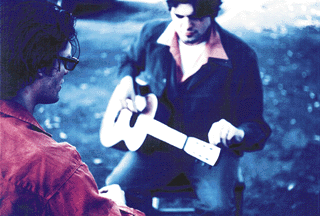 photograph by Todd V. Wolfson |
Charlie, who's been written off as both a blues guitarist and a post-wave rocker, performed onstage with his idol Tom Waits earlier this year, punctuating the fact that he shares more in music spirituality with Alejandro Escovedo than Stevie Ray Vaughan. Will, whose writing credits range from work with Waylon Jennings and Stephen Stills to Joe Ely and Bill Carter, names Terry Allen and Sheryl Crow hitmaker David Baerwald among his favorite writing partners.
Both Sextons have stable, long-term marriages, and Will plays devoted father to four-year-old McCauley. The Charlie Sexton Sextet still enjoys acclaim for last year's Under the Wishing Tree, even if it didn't sell as well as hoped, while Will's musical collaborations keep him on the run between Austin and Los Angeles. And then there's the upcoming recording project on which the siblings have embarked. The road to success was never easy, but right now, life is looking pretty damn good for the Brothers Sexton.
Inside a high- ceilinged rectangle in the Austin Rehearsal Complex that is clearly his haven, Charlie is hunkered down amidst an exotic orchestra of instruments. Guitars, steel guitars, dobros, and other string instruments line one wall, while a piano, various drums, accordions, maracas, and other sundry rhythm utensils line another. By the front door is a stand-up bass, and another tableau of guitars, a cello and a dulcimer. "I love guitars... drums... these instruments. They're so curvy. It's like looking at a beautiful woman. I just love them -- the instruments." He flashes the movie star smile that made him the idol of young Japanese girls in the mid-Eighties, and monkeys around duping some cassettes.
In the background, down the hall, a punchy brass section is riffing on "Messin' With the Kid." That would be Ian Moore, another stalwart of the venerable complex. Charlie himself is one of the senior residents. "I just quit smoking recently," he says, tossing a cassette in his hand, that luminous Sexton smile on display again. "So I have to do something with my hands."
Charlie has just listened to a tape of the Waits show, which fell on his birthday. He's thrilled with it. "Someone gave [the tape] to my brother and he gave it to me," he explains. "Waits had me go out and do the encore with him." Charlie goes into an impromptu Waits impression, hunching over and lifting an imaginary mike to his mouth, his left arm swinging spasmodically while he stomps his foot and growls unintelligibly. This cracks me up. Charlie's willingness to clown for me is as endearing as his imitation of someone we both admire tremendously.
He straightens up and reaches for a mandolin, plucking its delicate strings as he talks about a professional career that began when he announced he was moving to Austin at age 12. It didn't phase his mother much, perhaps because, as Charlie explained in an unusually frank record company biography for his last album, he and his mother grew up together.
Kay was 16 when she gave birth to Charles Wayne Sexton on August 11, 1968 in San Antonio, and was not yet married to Mike Sexton. She was barely 18 when Will Allan Sexton was born, one day shy of two years later, August 10, 1970. The boys' father was striking to look at, with high, wide cheekbones, mischievous hazel eyes, long sandy brown hair, a flashy rogue's smile, and a penchant for trouble. Kay was petite, a pretty brunette with soft hair waving past her shoulders and beautiful liquid-brown doe-eyes, who had grown up in a fundamentalist Christian family in San Antonio. Young Charlie seemed to take his light coloring from Mike while Will took his from Kay -- though both inherited the high, sculpted cheekbones of their father.
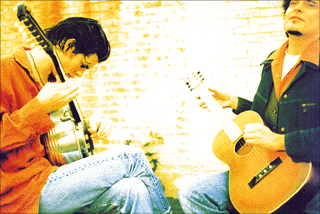 photograph by Todd V. Wolfson |
For a whole generation of kids, this was a normal childhood -- just ask Ian Moore, Jake Andrews, Lisa Pankratz, or Tyrone Vaughan. Back then, having a little guitar clutched in a tiny hand was the natural step to follow the teddy bear. For Will and Charlie Sexton, going to clubs and falling asleep to live music was simply another part of their youth.
But life in Austin had its unpleasant side too. In the early Seventies, Mike Sexton was busted on a pot charge and sent to prison. In his absence, a small-time Cajun dope dealer from Louisiana, whom Sexton had known peripherally, made himself at home with Kay and the boys, who were just starting elementary school. Trapped by circumstances that led her to depend on his support while Mike was in prison, Kay survived the man's abuse, eventually breaking away. When Mike got out of prison, he felt alienated from his family and stayed away until reconciling with them in the Eighties. The Cajun, meanwhile, would later turn up dead in a Louisiana bayou.
Things eventually got a little better for the single mother and her two boys when Kay met another man, one who was not abusive. This one, in fact, was a musician, an Austin bass player named Speedy Sparks. Kay's boys idolized him and he in turn treated them lovingly, helping shape the young Sexton boys as much as anyone, long after he and Kay split up and she re-married. It was Sparks in particular that turned young Charlie towards music, giving rise to one of the most public and well-documented careers in Austin's musical history -- one that's as chaotic as it is meteoric and uneven.
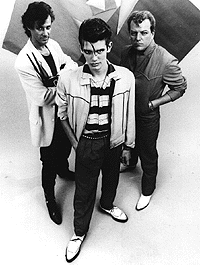 Charlie Sexton and the Eager Beaver Boys. Gary "Mudkatt" Smith and Alex Napier |
When the Angels folded their wings in 1993, Charlie already knew where he was going. His subsequent band and album, the Charlie Sexton Sextet and Under the Wishing Tree, revealed a more introspective Charlie, with songwriting much matured. Many of the compositions on Wishing Tree were biographical; there was "Spanish Words," about his father doing time, and "Plain Bad Luck and Innocent Ways" about Kay. Writing about family, working with family, the seeds of a project involving both Will and Charlie were already being sown. Things were already coming full circle.
But Charlie hadn't just grown up; he'd done it in front of an audience under less-than-ideal circumstances. Whereas most kids have a peer group their age, Charlie's peer group included Clark, Ely, the Vaughans, Lou Ann Barton, Kim Wilson, then-Continental Club manager Wayne Nagel, and luthier Ted Newman Jones. Austin's club scene was his -- and later Will's -- playground. He made the most of his circumstances, saying in retrospect, "We were maybe the last generation to benefit from the blues masters [at Antone's]. We were really fucking lucky to have had the influences we did firsthand -- Albert Collins and so forth. We were really lucky we didn't learn blues off Led Zeppelin's first record."
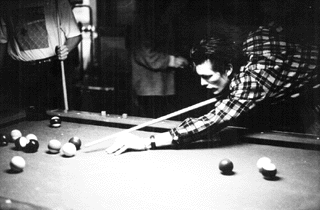 Charlie Sexton's version of modern english |
Will Sexton is a little late arriving at the ARC. He bursts into the rehearsal space, his thick brown hair windblown and dark eyes merry. "Bliss is working in Westlake Hills and I forgot about that Christmas tree in the park. I drove right through the middle of that Santa's Village thing on the way over. How long do I have to live in this town to remember that's there!"
Charlie kids him good-naturedly. "You're late because you had to go through Santa's Village?"
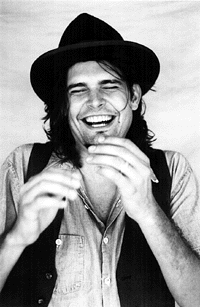 Will Sexton photograph by Todd V. Wolfson |
The younger of the Sextons has a reputation for being prickly -- especially with the press -- though no more so than Charlie. They're both nice guys, their friends say immediately, then the hedging begins, Well, Charlie's a sweetheart and so is Will, but Will can be mercurial, they say. No, say others, Will's just a perfectionist, driven to achieve the best he can and not settling for anything less. He hasn't always been treated well in the press. Well, that lack of appreciation for the Fifth Estate is understandable; Will sometimes got the short end of the stick often poked at Charlie. Former Chronicle columnist Michael Corcoran, for one, referred to Will's career a "Magic Coattail Ride." Corcoran said much meaner things about Charlie.
"For years I've tried to hone being able to articulate stuff that means something to me, on something I have to say," says Will, explaining his relationship with the press. "And for a long time, I felt that when people came in for interviews, they'd come in with an idea already of what they wanted me to say. So I'd say all this stuff about what I felt and in the end it was..." He shrugs and makes a face, "well, uh....
"For example, in Little Rock once, at the end of an interview the guy asked what I was doing and I said I had this Ford from my brother that I was driving. Then we said goodbye. So I read the interview, and it has me driving around in Charlie's car, which had some sort of parallel significance to what he thought I was doing as an artist or a human being or what have you. But mainly I've never found much use in doing interviews when I'm not making records. It just seems less than important to keep people filled in with what I'm doing personally."
And Will is outspoken. When I told him in a previous interview that I was a little nervous about writing about two people I'd watched grow up, he replied bluntly, "Nothing has ever really penetrated us... There's this generalization of who Charlie and I are and what our life is like, but I don't think anyone has a clue who we are. I think people can see us as being quite normal, but to those who saw the degenerate quality in our lives, it's real amazing we came through it. It's kind of bizarre, too, because Charlie and I have two different recollections of our childhood."
Charlie agrees. "I forgot that there's so much Will doesn't remember," he says. "Which is fortunate, because if he doesn't remember the good times, he doesn't remember the bad times, either. For so long, I couldn't understand how he'd just..." Charlie whistles through a sailing motion. "Then I'd think, `Oh. He doesn't remember...'"
 Charlie Sexton photograph by Todd V. Wolfson |
The fire that burned so brightly for Charlie also burned for Will. When he returned to Austin, he was already over the wild days and ready to pursue songwriting. Soon after, at the tail end of the Eighties, Will met Bliss McCauley and three years later their son was born. If things seemed unstable during his childhood, he now sought that stability for his own family. Somewhere along the line, he'd also developed a well-defined sense of direction.
"I always felt better doing projects," explains Will. "That's what I enjoy, being a part of something... I like doing something creative and I like being part of something that's not all me. It's interesting to have this log of your life of working with different musicians and different styles... [When I say] I don't care about being a musician, it's because `musician' is such a strong word, a serious word. `Musician,' to me, is someone whose whole life is music. In the younger set, that's like Doyle Bramhall II or Charlie. You have to master an instrument to be a musician."
Charlie expounds on Will's thought. "Basically, what he's saying is something he told me months ago; `I don't sit around and play guitar.' Well, I don't either!" says Charlie, glaring at Will playfully.
Will kicks back and laughs. "Actually, the payback for that comment -- and I don't even think I said it! -- was `Yeah, Charlie sits around and plays guitar... and violin... accordion... piano...'" The brothers laugh in harmony.
It seems somehow appro- priate during this holiday season that Will and Charlie are giving themselves to each other now. Charlie is adamant that the decision for the brothers to record together was an effort that had to happen at just the right time -- they'd had false starts already.
"Will and I were playing together one night before the last Sextet record, and it just wasn't the right time. I looked over on stage one night and he was just..." Charlie imitates Will playing guitar and being off in his own world. "After the gig, I said, `Listen, man, you gotta really really wanna do this.'"
Will nods in assent. "[Bliss and] I had just had a son then -- which was a shocking experience -- and Charlie and I talked and realized that I wouldn't go on tour then. It just wasn't feasible with a new baby."
It did become feasible this year, however, and with both careers on track. Some material is written -- even recorded -- but the bulk of the album will come later when management has found a label. The Sextet will be on board playing behind the brothers, making the band name actually fit the numeric designation that has become such an in-joke.
"Charlie, unfortunately, does most of the looking over his shoulder because he's doing all the production and generally has the musical themes," says Will. "I'm the one that's thinking about shit that doesn't have anything to do with songwriting. I think of all these concepts. I'm the concept guy!
"Yeah, that occurs right when we're working on a song," Charlie adds mischievously. "And he'll go onto his big concept that's so involved it takes a while to explain. Finally, I'll go, `Okay, I see. It's like this...' and then [Will] goes into the history on the characters in the song. It's not like he writes the lyrics and I do the music. I just don't have the brain capacity or the space for some of those pieces he does and that's the great marriage about us -- he'll do all the research."
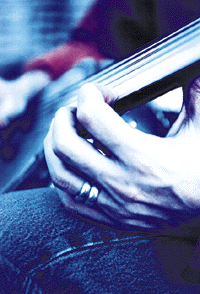 photograph by Todd V. Wolfson |
"Hey! You know what happens to kings!" Charlie protests playfully, then mutters, "They get crucified."
"Okay. He's the one-legged prince of that." Will concedes jokingly. "He's got that great talent of having lyrics that are simplistic and poignant."
"I'm not a great lyricist in the way he is..." Charlie defers to Will, "but that's the great marriage..."
"...Yeah, just write something poignant and everybody understands!" Will shoots back. "Charlie's true talent is that he has such a deep psychosis that he tries to write and it ends up being..."
"...`Helter Skel-ter?'" Charlie offers.
Will snorts with laughter and finishes. "You listen to the lyrics of a song, and even if they're a flat-out lie, that's great as long as the listener gets that."
Charlie nods. "There's a line at the end of a verse of a song we're doing [for this record]. And the last line of the verse is `...his heart was broken before it could learn to communicate...' And the ad-lib line that wasn't written was `and he ain't good at talking.' I almost took it out when I listened back to it, it made me so uncomfortable."
"I thought he wrote it about me!" Will exclaims.
"I wrote it about every fucking guy in the world," Charlie retorts.
"It's interesting, the songwriting process," Will reflects. "Charlie has Tonio K, and Terry Allen is the same way for me... the greatest gift is being able to surround yourself with people you respect."
"It's really difficult to find anyone to collaborate with," Charlie agrees. "Unless it's a strict one-does-music, one-does-lyric. Collaborating with people is not an easy thing to do to express that depth, that emotion, that reality -- whatever. So when you find people like that...." He smiles as his words trail off.
Will steps in. "If someone ferrets you out as someone they want to work with, they know what to expect. You might not have much in common with them, but together you work it out and come up with something. So many times your `ideal' songwriting partner is too similar, too compatible to work with."
Charlie nods. "I've been writing with Tonio K for 10 years."
Will teases. "Yeah, and I can't stand him."
"[Tonio K and I] are like The Odd Couple -- Felix and Oscar," says Charlie, laughing. "We'll be driving back from California and there'll be these episodes in the car that are like... well, he's Felix, I'm Oscar!"
"Tonio makes sure you know he's the Jack Lemmon Felix, not the Tony Randall one," adds Will with a smirk.
"When I'm working on a song," Charlie continues, "and I get to the stage where it's really something, it's like -- wow! I'll be in here listening and start thinking about the lyric and it's so exciting! And over a period it's easy to be jaded, especially when you've spent half your life doing it and haven't been completely successful much less applauded for the journey. It's better that we've waited until this stage for this project. We sort of grew together."
And what did you discover about each other you didn't know?
"Uhhhh..." Will makes a great show of feigning a lack of understanding.
"Want me to leave?" Charlie offers helpfully.
"No, I want you to make sure this is exactly what I said." Will pauses and speaks.
"I always kind of feared it would be the downfall of our relationship if we worked together. That's what I was afraid of. We'd much prefer to have a family than a band. But what I realized was that that made us closer. Spending more time together, we were able to figure each other out, to feel more comfortable, reach a broader understanding of each other. That was the surprise because it was my big fear to be put in a situation together real abruptly and then come away with career animosity toward each other. So basically this is us reworking our relationship, getting to know each other. "
Charlie smiles warmly at Will's words, at the expression of familial love and professional affection, and Will grins back. In a season which demands reflection upon such things, two brothers are finding their common ground, as deep and heartfelt a gift as can be given or received. For just these few minutes here, the years of toiling at recordings and gigs recedes into the background. Will and Charlie Sexton are not musicians or songwriters, they are exactly what they were born to be and nothing more: Brothers.
 |
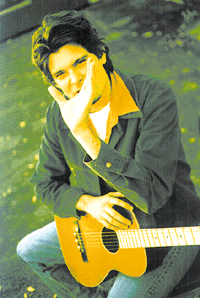 |
| cover photographs by Todd V. Wolfson | |







